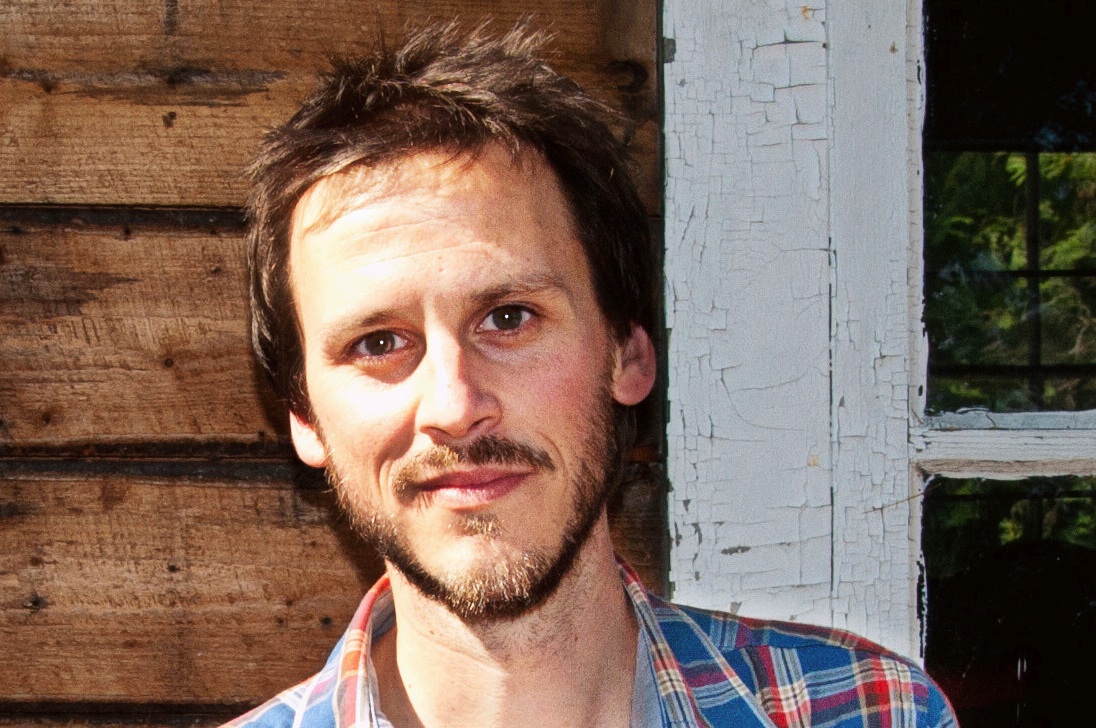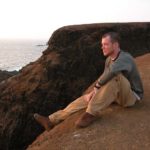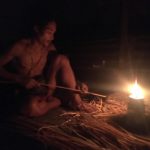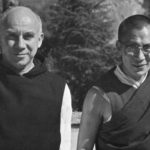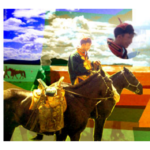Brian Kevin is the author of The Footloose American: Following the Hunter S. Thompson Trail Across South America. He’s a contributing editor at Down East magazine and an occasional contributor to Outside, Travel + Leisure, Men’s Journal, Sierra, Audubon, and the Fodor’s series of travel guidebooks. He’s also a recipient of a Lowell Thomas Award from the Society of American Travel Writers, and his work has received back-of-the-book “Notable” nods from The Best American Essays 2013
and The Best American Sports Writing 2013
. Home is currently a fishing village in Maine.
How did you get started traveling?
I’m one of those for whom a college semester abroad sparked a fondness for being away from home. My family did a lot of car-camping and road-tripping when I was a kid, but we weren’t of the class that takes vacations abroad, so it was nothing too exotic. Then I studied in Scotland as a college sophomore, and I was on a bit of a budget compared to others in my program, so by the time I got back to the states, I’d learned to hitchhike and nurse a bag of GORP for a week and cheat extra rides out of a rail pass. I’d also realized that total strangers could be almost heartbreakingly accommodating. All of that kind of rolled into this realization that, hey, if you want to, you can just pick up and go places. There’s less stopping you than you think. So that was kind of thrilling.
How did you get started writing?
I used to sell plasma for beer money as a college student, twice a week, without fail. And the plasma center in my town had all these great magazines lying around: Outside, The New Yorker, National Geographic Adventure, Harper’s. And I just fucking fell in love with those things. I was a philosophy major, and I really enjoyed writing for that — I had some papers accepted for conferences and undergrad journals and such. I’d never really thought much about journalism as a career, but I started super looking forward to those couple of hours in the plasma chair every few days, just getting my lifeblood sucked out of me and geeking out on Tim Cahill, Ian Frazier, Mark Jenkins, and that crowd. After college I bought a copy of the Writer’s Market and took a class on writing query letters at the local literary center. I sold a feature with the first query letter I ever wrote, to a magazine called Bluegrass Unlimited for a princely $.10/word. I thought that was pretty boss, so I just kept doing it.
What do you consider your first “break” as a writer?
I’m not sure if I’ve ever had that singular “break” moment, because the whole thing has developed super organically for me. A few good clips here earn you a crack at a couple of front-of-book pieces there, and a decent job with those gets you a shot at a feature over there, and those features grab the attention of that editor over there, and so on. I got a somewhat competitive internship in Minneapolis with zero formal journalism training, which helped a lot. Being in the MFA orbit at the University of Montana opened some doors, for sure, even though I have my criticisms about the relative value of an MFA. One day I got a call from Fodor’s looking for someone to write a kind of unique, quasi-narrative Yellowstone guidebook, on the recommendation of a former colleague. That definitely brought me more solidly into the travel writing fold. I still really enjoy guidebook work, and a lot of my writing and travel since then has revolved around national parks and other public lands.
As a traveler and fact/story gatherer, what is your biggest challenge on the road?
My inborn Midwestern shyness can sometimes be a bitch to overcome. Not shyness in the wallflower sense — I’m a pretty gregarious guy, and the fact that I enjoy talking to strangers is a big part of why this job appeals to me. But shyness in the sense of not wanting to stand out. I really dislike introducing myself as a journalist, for example. I’m straight-up allergic to just walking up to someone and asking for ten minutes of their time. When I travel, I almost never take photos unless I’m all alone, because it makes me feel weird and conspicuous. There are times when none of this is a problem, of course. If I can just walk around chatting and being a normal dude, then I’m aces. There are other times when I wish it didn’t make my blood pound in my ears just to walk up to someone and say, “Hello, I’m working on a story about taco stands or something. Can you please tell me what ingredients you use in your salsa?”
What is your biggest challenge in the research and writing process?
I do not write quickly. I sort of agonize over how to structure even simple stories, I’m fairly deliberate with my word choice, and I have a tendency to fall down rabbit holes of tangential research. All of this means I tend to grind out copy at a contractor’s pace.
What is your biggest challenge from a business standpoint?
The most difficult thing for a freelancer to balance, I think, is the need to make (better than) good on one’s current commitments while also always looking three, five, seven months out. I enjoy conceiving and pitching stories just as much as I enjoy writing them. I like the hustle, and I like how every loose idea in my notebook is just pregnant with awesomeness. That’s an essential attribute of a freelancer, of course, but I’ve found that it takes some discipline not to get so caught up in The Next Thing(s) that it intrudes on the time and brainpower I ought to be sinking into The Current Thing(s). And since some projects also require you to be your own post-publication hype man, I’m sometimes also still juggling The Last Thing.
Have you ever done other work to make ends meet?
Oh, shit yeah. I do some online teaching and the occasional guidebook gig that basically amounts to fact-checking. That’s not always stuff I super enjoy, but it’s the kind of work that doesn’t require a set schedule and allows for travel. It fills in the cracks. I’ve authored educational children’s books about guns, written marketing copy for a chain of hippie import stores, and been a ghostwriter for a wealthy fishing magnate’s autobiographical vanity project. I think freelancers snub that kind of off-the-wall stuff at their peril, because it’s horizon-expanding even when it’s not glamorous. I’m lucky to be going on five or so years now where more than half of my living comes from the kind of magazine and narrative work that I most enjoy. That’s about as high as I’ve ever aimed, to tell you the truth.
What travel authors or books might you recommend and/or have influenced you?
I’ve said this in other forums, but I’m a big fan of the “following in the footsteps” subgenre of travel writing, which I call the “stragglelogue.” Some of my favorite books in any genre are entries in that category: Scott Huler’s No-Man’s Lands, Patrick Symmes‘ Chasing Che
. Symmes is in that pantheon of ’90s/early 2000s Outside contributors who largely inspired me to take a stab at this in the first place: Cahill and the ones I mentioned above, Hampton Sides, Susan Orlean, Peter Stark, Florence Williams, Bryan DiSalvatore. I don’t know that all (any?) of those folks would characterize themselves as travel writers, but that’s probably true of most writers of travel-ish stuff who I admire. I think Tom Bissell is a goddamn genius. I admire his Chasing the Sea
for how seamlessly it blends humor with impeccable reportage with that atmosphere of moony contemplation I associate with W.G. Sebald and Ryszard Kapuscinski. Donovan Hohn’s Moby-Duck
is great for that too. I tore that original article out of Harper’s and carried it around with me during grad school.
What advice and/or warnings would you give to someone who is considering going into travel writing?
I preface this by saying that I don’t really think of myself as a “travel writer” so much as someone who does a lot of writing that necessitates travel (and most of that domestic). Still, I think I’m probably qualified to give some useful advice. There’s all the usual stuff, of course: do not expect to make a lot of money, select a partner who is cool with your prolonged absences and deadlines, thank your lucky stars for the Affordable Care Act.
But I would actually sort of dissuade anyone from thinking of “travel writing” as a field one can “go into,” like medicine or hotel management. You “go into” travel writing like you “go into” being a pop singer. You can expend a lot of effort writing and singing pop songs, sure. You can genuinely appreciate the pop songs of others and the way they inform your own pop songs, and you can even have studied music for several years at great expense before you began singing pop songs in earnest. But unless there is a critical mass of people who want to hear your pop songs so badly they are willing to pay money for it, you will not be “going into” pop singing, and this is not an indication that something is wrong with the music industry. Careers arise out of demand: We need a lot of accountants. We need a lot of mechanics. We do not need very many pop singers, and we sure as hell don’t need very many travel writers.
If I seem a little ranty about this, it’s because there is kind of a cottage industry out there of books and workshops and curricula that allegedly explain how to “become a travel writer.” Not just how to write about travel, which is a fine thing, but how to “become a travel writer,” which is disingenuous at best and predatory at worst. And what it leads to, among other things, is a lot of misguided griping about the dismal state of writing/journalism because of how hard it is to “make it.”
Look, if you have a master’s degree and a MacBook and spend forty hours a week writing pitches and blog posts about your travel experiences, but you’re still not making enough to pay the rent on your New York apartment, you should not interpret this as a sign that modern journalism is flawed and simply say, “Fuck it.” For starters, write other things. Writing is a trade, like plumbing, and you don’t get to just plumb kitchen faucets because you’re not super into toilets or showers or water heaters or septic tanks or whatever. Secondly, stop living in the most expensive place in the country. Sure, much of the publishing industry is there, but Al Gore invented the internet twenty years ago, and a writing career becomes a lot more feasible when you’re doing it out of a cottage in Maine or a double-wide in Montana. Finally, understand that you don’t really get to punch out. The pop star analogy trumps the plumber analogy in this regard. Be comfortable with the fact that you are always, to a great extent, on the job.
What is the biggest reward of life as a travel writer?
It is the next best thing to being a perpetual student at some kind of hippie-run, field-trip—heavy, tuition-less, curriculum-free, infinitely endowed university. If doing that were a possibility instead, I would drop the journalism thing like a bad habit.

